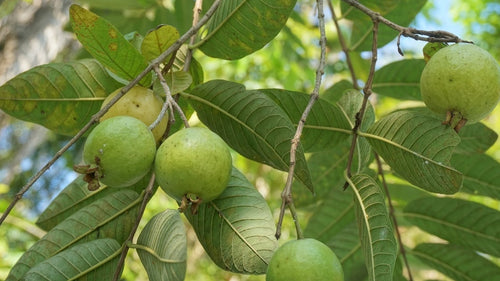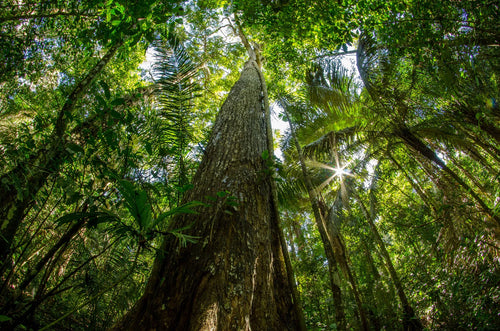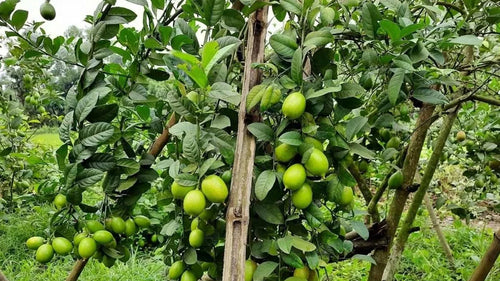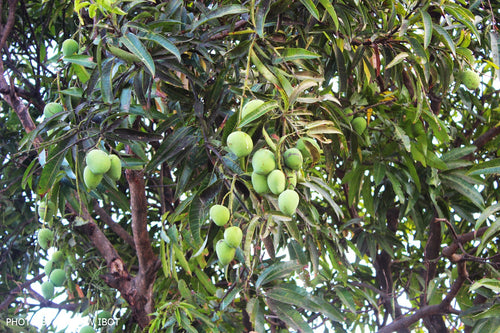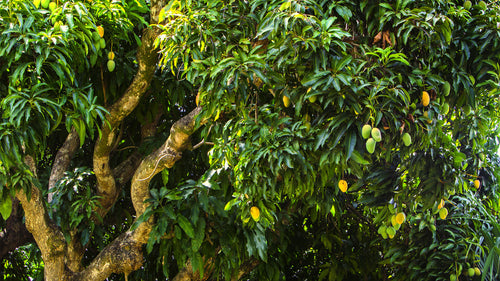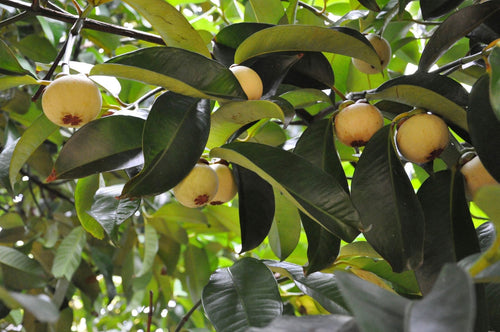Beyond the Waves: Castle Ships’ Agroforestry Drive for Climate Action
Castle Ships, a specialist seaborne carrier of clean petroleum products, is taking bold steps beyond the seas to contribute to a sustainable future. A Read more
Project Update 2
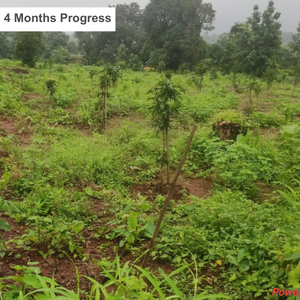
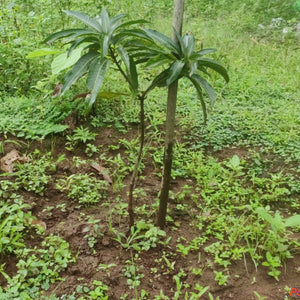
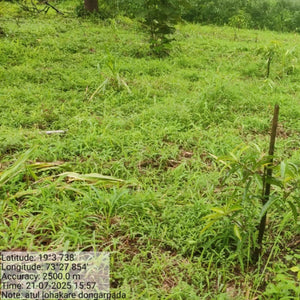
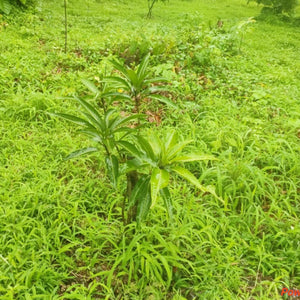
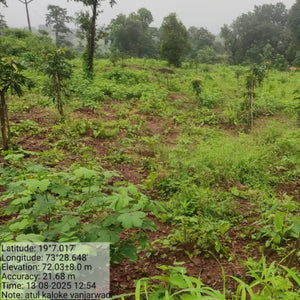
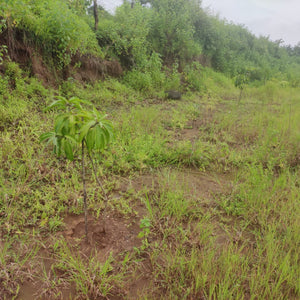
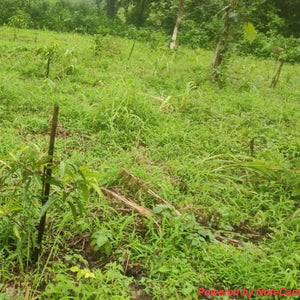
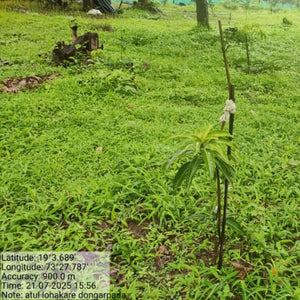
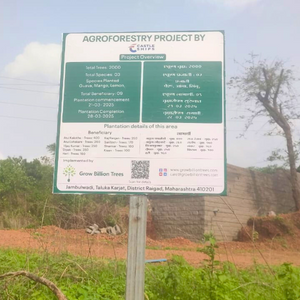

Project Update 1
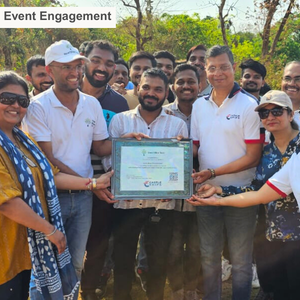
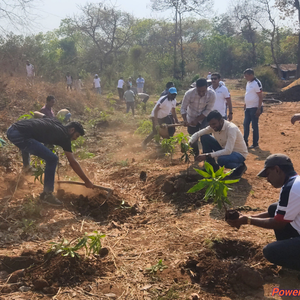
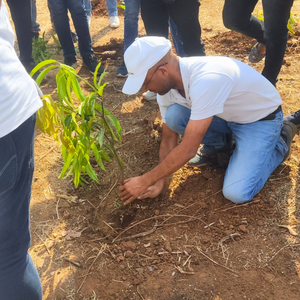
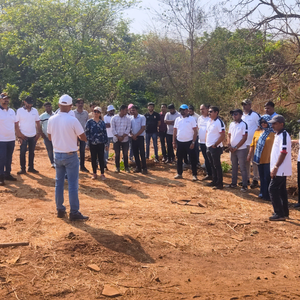
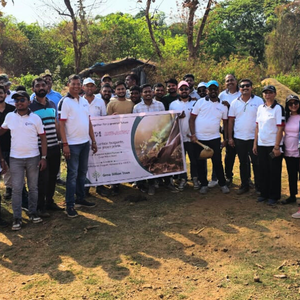
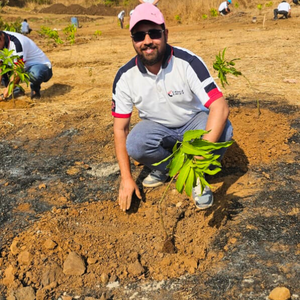
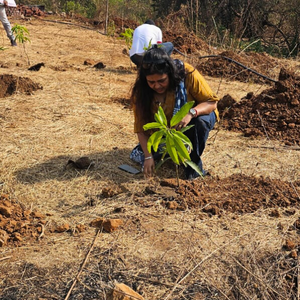
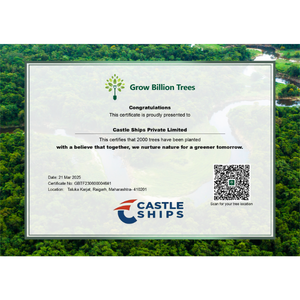
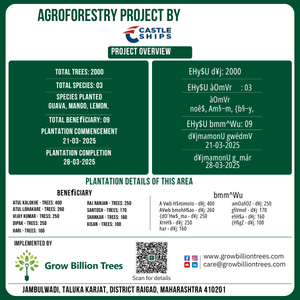

Digital Forest
Forest with 2,000 Trees planned
Want to plant your tree now?
Plant a Tree @ 299Beyond the Waves: Castle Ships’ Agroforestry Drive for Climate Action
Castle Ships, a specialist seaborne carrier of clean petroleum products, is taking bold steps beyond the seas to contribute to a sustainable future. As part of its commitment to environmental responsibility, Castle Ships has launched a tree plantation initiative under the agroforest concept to enrich biodiversity, absorb CO₂ emissions, and improve air quality in port areas. By integrating tree planting within agroforestry systems, the initiative fosters ecological balance, supports sustainable land use, and benefits local farmers through improved livelihoods, reduced farming costs, and enhanced income opportunities. The trees enhance soil fertility, reduce dependency on chemical fertilizers, and create alternative revenue streams through timber, fruits, and other forest products.
This effort aligns with Castle Ships’ core values of reliability and responsibility, ensuring that its impact extends beyond maritime operations to a greener future for communities and ecosystems. Let's give back to nature! Trees provide us with countless benefits, and planting more is a wonderful way to express our gratitude. By restoring forests damaged by human actions and natural disasters, we can make a real difference. Take action today and plant a tree to help our planet thrive!
Project Planning & Execution
No of Trees: 2000 Trees
Plantation Location: Jambulwadi, Taluka Karjat, District Raigad, MH 410201
Plantation Duration: March 21st, 2025 to March 28th, 2025
Name of Species: Guava, Mango, Lemon
Species Selection & Its Benefits:
The initiative prioritises the planting of native tree species, ensuring high survival rates and fostering long-term ecological stability. By aligning tree selection with local market demand, the project enhances environmental sustainability and provides farmers with viable income opportunities. Farmer consent and participation play a crucial role in species selection, ensuring that the chosen trees integrate seamlessly with existing agricultural practices.
The project strategically selected Guava (Psidium guajava), Mango (Mangifera indica), and Lemon (Citrus limon) for plantation due to their multiple economic, ecological and social benefits. These species are hardy and low-maintenance, providing a reliable income through their fruit while enriching soil fertility, reducing erosion, and creating a favourable microclimate for crops. This thoughtful selection supports both environmental sustainability and the economic stability of local communities. Additionally, the trees contribute to carbon sequestration, enhancing climate resilience while strengthening the region’s green cover. Their ability to thrive with minimal water input makes them well-suited for sustainable farming in the area.
Beneficiaries Details
|
SN |
Farmer Name |
Google Location |
Village Name |
Plot Size (Acres) |
Guava Planted |
Mango Planted |
Lemon Planted |
|
1 |
Atul Kalokhe |
Vanjarwadi |
0.62 |
100 |
280 |
20 |
|
|
2 |
Kisan Chango Kambdi |
Nagewadi |
0.13 |
0 |
100 |
0 |
|
|
3 |
Vijay Kumar Adhal |
Pathraj |
0.62 |
30 |
170 |
50 |
|
|
4 |
Shankar Tukaram Bhala |
Nagewadi |
5 |
50 |
100 |
10 |
|
|
5 |
Hari Janu Bhala |
Nagewadi |
5 |
50 |
100 |
10 |
|
|
6 |
Atul Laxman Lohkare |
Dongarpada |
2.5 |
50 |
160 |
50 |
|
|
7 |
Santosh Datatrey Shrikhande |
Potal |
2.5 |
20 |
150 |
0 |
|
|
8 |
Raj Ranjan Kumar |
Potal |
2.5 |
50 |
200 |
0 |
|
|
9 |
Dipak Kanhu Shrikhande |
Potal |
2.5 |
50 |
200 |
0 |
This initiative has empowered the farmers to adopt agroforestry, allowing them to benefit from improved soil fertility, enhanced water retention, reduced erosion, and a diversified source of income. By integrating trees with agriculture, the farmer has secured an additional livelihood opportunity through fruit trees, ensuring long-term financial stability. This effort not only contributes to environmental sustainability but also strengthens economic resilience, fostering a resilient farming model and contributing to the long-term well-being of the Sudumbre region.
Planting Methodology and Its Advantages
Agroforestry:
Castle Ship’s agroforestry initiative follows a strategic planting methodology that integrates trees, crops, and livestock on the same land, providing farmers with additional income and improving livelihoods. By combining agriculture and forestry, it enhances soil fertility, conserves water, and increases biodiversity while offering multiple revenue streams through fruits, fodder, and medicinal plants. This method reduces climate risks, improves farm productivity, and ensures long-term economic stability for farmers, making it a viable solution for sustainable rural development.
As part of its Corporate Social Responsibility (CSR) initiatives, Castle Ship embraces agroforestry as a key strategy for carbon sequestration, ecosystem restoration, and sustainable land management. This initiative underscores the company’s commitment to environmental stewardship, demonstrating a proactive approach to sustainability that contributes to a greener, more resilient future for generations to come. By adopting this integrated approach, Castle Ship not only enhances environmental sustainability but also strengthens local communities by promoting long-term economic stability for farmers, ensuring a balanced coexistence of agriculture and forestry.
Advantages of Agroforestry
-
Increased Farmer Incomes: This approach helps increase farmers' income by as much as 3 times. Farmers benefit from diversified income sources, lifting economic resilience.
-
Sustainable Livelihoods: Farmers benefit from diversified income sources through the sale of fruits and other tree-based products, reducing dependence on a single crop.
-
Enhanced Biodiversity: Agroforestry creates a diverse ecosystem by integrating trees with crops, attracting pollinators, birds, and beneficial insects that support natural pest control.
-
Environmental Sustainability: This model reduces carbon emissions and promotes sustainable land management, aligning with SDG 13 (Climate Action) and SDG 15 (Life on Land).
-
Food Security & Nutritional Benefits: Fruit-bearing trees provide a direct source of food, improving local nutrition while supporting long-term agricultural productivity.
-
Carbon Sequestration & Climate Resilience: Trees absorb carbon dioxide, helping mitigate climate change while providing shade and windbreaks that reduce temperature extremes and improve microclimatic conditions.
-
Soil Health and Water Conservation: Tree roots prevent soil erosion, enhance water retention, and improve soil fertility by fixing nitrogen and adding organic matter. Agroforestry systems also support groundwater recharge, reduce runoff, and improve soil moisture retention, making them ideal for drought-prone regions.
Activities During Tree Plantation
As part of Castle Ships India Pvt. Ltd.’s commitment to sustainability and environmental conservation, the company undertook a tree plantation initiative under the agroforestry concept, aligning with its Corporate Social Responsibility (CSR) goals to enhance biodiversity, improve soil health, and support local farmers. The plantation activities were meticulously planned and executed, ensuring optimal soil conditions, designated planting zones, and the careful selection of saplings that offer both ecological and economic benefits.
On plantation day, Capt. Kamlesh Thakur, CEO of Castle Ships, Mr. Ravi Bhatia, Director of Castle Ships, Mr. Satender Kumar, Co-Founder & CIO of Grow Billion Trees, and the dedicated Castle Ships employees came together to contribute to this impactful initiative. Mr. Satender Kumar delivered a brief introduction, emphasizing the significance of agroforestry, the long-term impact of the plantation, and the collective efforts required to drive sustainable environmental change.
Following the plantation, essential post-plantation care measures, including regular watering and protective steps, were implemented to enhance sapling survival rates. This initiative is a crucial step towards soil enrichment, water conservation, and biodiversity restoration while also strengthening farmers' livelihoods by diversifying income sources and promoting sustainable farming practices. Through dedication and strategic partnerships, Castle Ships India Pvt. Ltd. continues to lead impactful green initiatives, fostering a sustainable and eco-friendly future.
Conclusion Elements
Impact
Direct Impact
|
Parameters |
Values |
References |
|
No. of Trees Planted |
2,000 |
|
|
Green Cover (Acres) |
21.4 |
|
|
Fruit Production Potential (Tons/Year) |
52 |
|
|
Income Generation Potential (Rs/Year) |
1,327,500 |
|
|
Carbon Sequestration Potential (KG) |
20 |
Small to medium-sized trees can sequester around 10–48 kilograms (22–106 pounds) of CO₂ annually. https://onetreeplanted.org/blogs/stories/how-much-co2-does-tree-absorb |
|
Carbon Sequestration by 2000 mature trees ( Tons/year) |
40 Tons |
No. of Trees x Carbon Sequestration by 1 mature trees per year |
|
Carbon Credit Equivalent |
40 |
One carbon credit is equivalent to one tonne of carbon dioxide or the equivalent amount of another greenhouse gas. |
|
Carbon Footprint of an avg Indian Citizen (Tons/Year) |
1.8 |
|
|
Offsets Annual Carbon Footprint of (Adults) |
22 |
Carbon offset by 2000 mature trees per year / Carbon Footprint of an avg Indian Citizen per year |
* This impact analysis is forward-looking (An Agro-forestry project matures in 3-5 years)
Indirect Impact
Community Impact
-
Empowerment of Farmers - By providing training and resources for sustainable farming practices, agroforestry equips farmers with skills to enhance productivity and adapt to environmental changes.
-
Food Security – By integrating fruit-bearing trees into agricultural systems, the initiative ensures a stable food supply, providing nutritious produce for both consumption and market sale.
-
Environmental Awareness – The project educates the local community on the importance of tree planting, biodiversity conservation, and sustainable land use.
-
Enhanced Social Equity – Agroforestry initiatives foster enhanced social equity by empowering marginalized farmers with sustainable livelihoods, bridging economic gaps, and promoting inclusive community participation in environmental conservation efforts.
-
Resilience to Climate Change – Agroforestry improves soil health, enhances water retention, and reduces land degradation, making farming communities more adaptable to changing climate conditions.
-
Health and Well-being – Increased green cover improves air quality, reduces heat stress, and provides access to nutrient-rich fruits, contributing to the overall health of local communities.
Environmental Impact
-
Carbon Sequestration: Trees act as carbon sinks, absorbing significant amounts of CO2 from the atmosphere, helping to mitigate climate change and reduce greenhouse gas emissions.
-
Soil Health Improvement: Agroforestry enriches soil through organic matter from fallen leaves and roots, improving fertility, structure, and nutrient availability for crops.
-
Erosion Prevention: Tree roots stabilize the soil, reducing erosion caused by wind and water while protecting nearby agricultural fields and water bodies.
-
Biodiversity Conservation: By creating habitats for various species, agroforestry enhances biodiversity, supporting pollinators, beneficial insects, and native wildlife.
-
Water Cycle Regulation: Trees improve water retention, recharge groundwater levels, and reduce surface runoff, contributing to a more balanced and sustainable water cycle.
-
Microclimate Regulation: Agroforestry moderates temperature extremes, reduces wind speeds, and increases humidity, creating favorable conditions for crop growth and ecosystem balance.
Achievements
SDG Goals Achieved through Agroforestry
-
SDG 1: No Poverty – By integrating agroforestry with traditional farming, Castle Ships’ initiative provides farmers with additional income sources through fruit yields, improving economic resilience and reducing poverty in rural areas.
-
SDG 2: Zero Hunger – The plantation of fruit-bearing trees such as Guava, Mango and Lemon enhances food security by offering nutritional produce while improving soil health for sustainable agricultural productivity.
-
SDG 3: Good Health and Well-Being – Tree plantations improve air quality, soil fertility, and water conservation, creating a healthier environment for local communities. The presence of green spaces also promotes mental well-being.
-
SDG 4: Quality Education – Castle Ships’ agroforestry initiative includes farmer training on sustainable land-use practices. These educational efforts equip farmers with knowledge on conservation, resource management, and climate-resilient agriculture.
-
SDG 6: Clean Water and Sanitation – By reducing soil erosion, improving groundwater recharge, and minimising surface runoff, the plantation promotes sustainable water management in the region.
-
SDG 8: Decent Work and Economic Growth – The initiative generates employment opportunities for rural communities, provides training in sustainable agroforestry, and supports long-term economic growth through enhanced land productivity.
-
SDG 9: Industry, Innovation, and Infrastructure – Castle Ships’ project integrates innovative agroforestry techniques, including multi-layer cropping systems and soil conservation methods, fostering sustainable land use and industry-community collaboration.
-
SDG 10: Reduced Inequalities – By involving small-scale and marginalised farmers, the project promotes economic inclusivity and reduces inequalities by ensuring equitable access to agroforestry benefits.
-
SDG 12: Responsible Consumption and Production – Agroforestry reduces dependency on chemical inputs, promotes organic farming, and ensures the responsible use of natural resources, supporting sustainable agricultural practices.
-
SDG 13: Climate Action – The planted trees act as carbon sinks, sequestering atmospheric carbon dioxide, enhancing ecosystem resilience, and mitigating the effects of climate change in the region.
-
SDG 15: Life on Land – This initiative promotes biodiversity conservation, prevents deforestation, and restores degraded land, fostering healthy ecosystems and sustainable forestry practices.
-
SDG 17: Partnerships for the Goals – The collaboration between Castle Ships India Pvt. Ltd., Grow Billion Trees, and local farmers demonstrates the power of partnerships in achieving sustainability goals and fostering large-scale ecological restoration.
ESG Achieved through Agroforestry:
-
Environmental Impact: Castle Ships’ agroforestry initiative plays a crucial role in environmental sustainability by enhancing carbon sequestration, restoring biodiversity, and improving soil and water conservation. The plantation of native and fruit-bearing trees—Guava, Mango and Lemon—supports climate change mitigation by reducing greenhouse gas emissions and increasing ecosystem resilience. Additionally, the project helps prevent soil erosion, improves groundwater retention, and contributes to a healthier, greener landscape. By integrating sustainable agroforestry practices, this initiative ensures long-term ecological benefits, fostering a self-sustaining environment that supports both nature and local communities.
-
Social Impact: The initiative brings significant social benefits by fostering sustainable livelihoods, improving food security, and enhancing community well-being. By integrating fruit-bearing trees, the project helps farmers diversify their income sources, ensuring greater economic stability and resilience for rural households. Agroforestry practices optimise land use efficiency, leading to higher agricultural productivity while maintaining ecological balance. The plantation also contributes to better air quality, creates green spaces for community well-being, and encourages local participation through awareness programmes. By engaging and educating stakeholders, the initiative empowers communities with the knowledge and skills to adopt sustainable land management practices, fostering long-term environmental and social sustainability.
-
Governance Impact: Castle Ships India Pvt. Ltd. upholds strong governance principles by committing to ethical and responsible corporate practices in sustainability. The agroforestry initiative aligns with the company’s broader Corporate Social Responsibility (CSR) strategy, ensuring transparency, accountability, and long-term impact. By collaborating with Grow Billion Trees, farmers and local communities, Castle Ships fosters strategic partnerships that promote environmental stewardship and responsible land management. This initiative reflects the company’s dedication to integrating ESG (Environmental, Social, and Governance) principles into its corporate framework, showcasing leadership in sustainability and social responsibility.
Building Communities
Castle Ship’s agroforestry initiative goes beyond tree plantation—it strengthens rural communities by empowering farmers, fostering collaborations, and creating sustainable livelihoods. By integrating environmental stewardship with social impact, the project nurtures a sense of shared responsibility, driving long-term benefits for both people and the planet.
-
Empowering Farmers: Castle Ship’s agroforestry initiative strengthens farmers’ economic stability by diversifying income sources and improving agricultural productivity. By integrating tree plantations with existing farmland, farmers benefit from enhanced soil fertility, better crop yields, and long-term financial gains. This initiative promotes self-sufficiency and long-term environmental stewardship, ensuring a sustainable future for both farmers and the ecosystem.
-
Fostering Partnerships: Collaboration is at the core of Castle Ship’s plantation initiative, bringing together corporate, environmental, and community stakeholders. The partnership between Castle Ship Private Limited, Grow Billion Trees, and local farmers created a strong foundation for sustainable development. By leveraging collective expertise and resources, this initiative ensures that environmental and social benefits extend beyond the immediate plantation, fostering long-term ecological and economic resilience.
-
Creating a Ripple Effect: The impact of this initiative goes beyond tree planting; it sets in motion a chain reaction of positive environmental and social change. By improving biodiversity, enhancing carbon sequestration, and promoting sustainable farming, the project contributes to a healthier ecosystem. Additionally, as more farmers adopt agroforestry practices, the region experiences long-term economic and environmental benefits, inspiring further community-driven conservation efforts.
This initiative proved that environmental sustainability thrives when rooted in community effort. It’s not just about planting trees—it’s about planting hope, collaboration, and a shared vision for a greener tomorrow.
Commitment by Grow Billion Trees
-
Ensuring Tree Survivability: GBT prioritizes native species, continuous monitoring, and soil health improvement using organic fertilizers. These efforts ensure sustainable growth and benefit the farmers and communities.
-
Transparency & Accountability: GBT provides detailed reports on tree growth, survival rates, and carbon benefits, using geo-fencing and regular updates to maintain transparency and effectiveness.
-
Sustainable Plantation Efforts: GBT implements projects that balance environmental, social, and economic goals, addressing urban heat islands and degraded farmlands. These efforts promote ecological balance, livelihoods, and long-term climate resilience.
-
Enhancing Ecosystem Health: By selecting native species and creating diverse habitats, GBT enhances biodiversity and ecosystem resilience, ensuring long-term ecological health and supporting wildlife.
-
Long-Term Impact: GBT’s initiatives tackle environmental challenges, enhance rural livelihoods, foster climate resilience, and promote sustainable development while reducing carbon footprints.
Acknowledgment
We extend our heartfelt gratitude for the successful completion of the plantation initiative at Jambulwadi, Taluka Karjat, District Raigad, Maharashtra. This achievement represents a significant step towards environmental restoration, sustainable land use, and community empowerment. It would not have been possible without the collective efforts of dedicated individuals, local farmers, and partner organisations. Their unwavering commitment has played a crucial role in fostering a greener, more resilient ecosystem for future generations.
To Castle Ship Private Limited: We sincerely thank Castle Ship Pvt. Ltd. for its unwavering dedication to sustainability and environmental conservation. By integrating agroforestry into its Corporate Social Responsibility (CSR) initiatives, Castle Ships has demonstrated a strong commitment to fostering greener landscapes and supporting local communities. We deeply appreciate Castle Ships' initiative in planting 2,000 trees, including Guava, Mango, and Lemon. This effort will enhance biodiversity, improve soil health, and contribute to carbon sequestration, ensuring long-term ecological and economic benefits. Moreover, by promoting sustainable land use, this initiative plays a vital role in supporting farmers, providing them with an additional source of income through fruit production. Castle Ships' dedication to environmental sustainability and community upliftment is truly commendable, and we are grateful for its contribution to a greener and more resilient future.
To the Farmers of Jambulwadi: Your dedication to embracing agroforestry and incorporating fruit-bearing trees into your farming practices is truly commendable. This initiative not only enriches soil health but also strengthens long-term agricultural sustainability. Your commitment to fostering a healthier ecosystem while securing a better future for future generations is inspiring. We are grateful to be part of this journey and look forward to witnessing the lasting positive impact of your efforts.
To the Local Community: The dedication and enthusiasm of the local community have been instrumental in the success of this initiative. Your active involvement in embracing sustainability has turned this vision into reality. The positive impact seen today reflects your hard work and commitment to building a greener, more sustainable future. We sincerely appreciate your support and engagement in making this plantation drive with Castle Ship a meaningful step toward environmental and community well-being.
To Our Ground Partners and Volunteers: Your dedication, expertise, and passion for environmental conservation have been essential in making this initiative a success. Through our collective efforts, we have shown that collaboration and a shared vision for sustainability can create a lasting impact. Your invaluable contributions have played a crucial role in driving this mission forward, and we deeply appreciate your commitment. Thank you for being an integral part of this journey toward a greener future.
Through this collective effort, we have taken significant steps toward revitalizing ecosystems, promoting sustainable agriculture, and enhancing the livelihoods of farmers in Jambulwadi. This is just the beginning, and we look forward to strengthening our partnership in pursuit of a greener, more sustainable future for all.
Thank you for your unwavering commitment and support.
Closing Remarks
The successful completion of the agroforestry plantation at Jambulwadi, Taluka Karjat, District Raigad, Maharashtra, marks a significant milestone in Castle Ships India Pvt. Ltd.’s journey towards environmental sustainability and community empowerment. This initiative has not only expanded the region’s green cover but has also provided long-term benefits to local farmers by integrating sustainable agricultural practices.
By enhancing soil fertility, supporting water conservation, and generating additional income through fruit production, the project strengthens livelihoods and promotes financial stability for farming communities. With 2,000 trees now flourishing—including Guava, Mango and Lemon—this initiative will continue to contribute to ecological balance, biodiversity restoration, and climate resilience.
As we celebrate this achievement, we reaffirm our commitment to driving impactful sustainability efforts and inspiring more organisations and individuals to take action for the environment. We extend our deepest gratitude to Castle Ships India Pvt. Ltd., the farmers of Jambulwadi, our partners, and all those who contributed to making this project a success. Your dedication and collaboration have been instrumental in turning this vision into reality.
This is just the beginning of a larger movement towards a greener and more sustainable future. Through collective efforts, we can build a resilient environment and leave a lasting legacy for generations to come.
Trees for Corporates
Trending
Most Popular
1. Castle Ships Sustainability Initiative
Castle Ships isn’t just about navigating the seas; it’s about steering the world toward sustainability. Through its agroforest tree plantation initiative, Castle Ships ensures that while its fleet moves clean petroleum products, its green commitment offsets environmental impact. With trees soaking up CO₂ emissions like a sponge, port areas breathe fresher air, and local farmers reap economic benefits. This isn’t just corporate social responsibility; it’s a voyage toward a greener future, proving that sustainability and shipping can sail side by side. Anchoring eco-consciousness? Now that’s smooth sailing!
2. Agroforestry for Maritime Impact
ships keep sailing, farmers keep thriving, and the planet gets a little greener. Who knew trees could be such a great crew?
3. Carbon Sequestration in Ports
Ports are the lifelines of global trade but also hotspots of carbon emissions. Castle Ships is flipping the script by using agroforests as natural carbon sinks. With trees acting as CO₂ vacuums, this initiative absorbs emissions, enhances biodiversity, and creates healthier environments for port communities. It’s like giving the atmosphere a much-needed detox—no greenwashing, just green-growing. When it comes to sustainability, Castle Ships isn’t just dipping its toes; it’s diving right in!
4. Farmers’ Economic Growth through Agroforestry
Tree plantations aren’t just about saving the environment—they’re about enriching lives. Castle Ships’ agroforest initiative does just that by providing farmers with alternative income sources. From fruit-bearing trees to medicinal plants, agroforestry reduces farming costs while increasing revenue opportunities. It’s like a financial lifejacket in an unpredictable agricultural sea. With trees as assets, farmers don’t just grow crops—they grow their future!
5. Green Maritime Responsibility
Castle Ships believes sustainability isn’t a destination; it’s a journey. By integrating tree plantation with maritime operations, they’re proving that the shipping industry can be both efficient and eco-friendly. Their agroforestry initiative ensures that each planted tree contributes to cleaner air, healthier ecosystems, and more resilient local communities. In an industry that moves goods worldwide, Castle Ships is also moving the needle on environmental responsibility. Now that’s a course worth charting!
6. Enhancing Port Area Biodiversity
Ports are often bustling hubs of activity, but not exactly known for lush greenery—until now! Castle Ships’ agroforest project transforms these industrial spaces into thriving ecosystems. By planting diverse native species, they attract birds, bees, and biodiversity back to the area. Who knew ports could double as nature reserves? With each tree, Castle Ships is turning concrete landscapes into green sanctuaries, proving that sustainability belongs in every port of call.
7. Corporate-Community Collaboration for Sustainability
When businesses and communities join forces, magic happens. Castle Ships’ tree plantation initiative is a stellar example of how corporate efforts can directly uplift local farmers. With GBT volunteers and employees working alongside farmers, this initiative fosters shared responsibility, empowerment, and long-term ecological impact. It’s not just about planting trees—it’s about growing partnerships that last. Sustainability is always better when it’s a team effort!
8. ESG Commitment in the Shipping Industry
Castle Ships isn’t just talking the ESG talk—it’s walking (or rather, sailing) the walk. By investing in agroforestry, they reinforce their Environmental, Social, and Governance principles, ensuring that sustainability isn’t just an add-on but a core value. Cleaner air, better livelihoods, and responsible governance—this initiative ticks all the right ESG boxes. Who said ships can’t plant roots?
FAQ
What is Castle Ships' tree plantation initiative about?
Castle Ships has launched a tree plantation initiative under the agroforest concept to enhance biodiversity, absorb CO₂ emissions, and improve air quality, especially in port areas. By planting trees, we are actively contributing to a greener environment while supporting local farmers through sustainable agroforestry. This initiative aligns with our commitment to environmental responsibility, ensuring that our maritime operations leave a positive impact on both nature and communities.
How does Castle Ships’ tree plantation initiative benefit farmers?
Our agroforest initiative helps farmers by providing them with additional income sources, reducing farming costs, and improving soil fertility. By integrating tree plantations into farmland, we create sustainable agricultural models that offer long-term economic stability. Farmers benefit from fruit-bearing trees, timber, and other agroforestry products, enhancing their livelihoods while also contributing to environmental conservation.
Why did Castle Ships choose the agroforest concept for tree plantation?
The agroforest concept ensures that tree plantation efforts not only benefit the environment but also support local communities. This method integrates trees with agriculture, improving biodiversity, reducing soil erosion, and enhancing carbon sequestration. It also creates sustainable livelihoods for farmers, making it a well-rounded solution for both ecological restoration and social impact.
How does Castle Ships' initiative help in carbon sequestration?
Our initiative helps capture and store atmospheric CO₂ through large-scale tree plantations in agroforests. These trees act as natural carbon sinks, absorbing emissions from port activities and maritime operations. By doing so, we contribute to climate change mitigation while promoting cleaner air in industrial and urban areas.
What role does Castle Ships play in improving air quality?
By planting trees in port areas and surrounding regions, Castle Ships actively works to improve air quality. Trees filter pollutants, reduce dust levels, and increase oxygen production, making the environment healthier for local communities. Our initiative is a step towards making industrial zones more livable and sustainable.
How does Castle Ships’ tree plantation align with sustainability goals?
Our initiative supports multiple Sustainable Development Goals (SDGs), including Climate Action, Life on Land, and Sustainable Communities. Through responsible environmental practices, carbon sequestration, and economic benefits for farmers, we ensure that our operations contribute to a more sustainable and resilient future.
What activities take place during Castle Ships’ tree plantation initiative?
Farmers prepare the site in advance, ensuring the land is suitable for plantation. Employees, GBT volunteers, and farmers then plant saplings in pre-dug pits and water them to ensure their healthy growth. This collaborative effort strengthens community involvement and ensures the long-term success of the plantation.
How does Castle Ships balance shipping operations with environmental responsibility?
While we specialize in seaborne transport, we recognize our responsibility to offset environmental impact. Our tree plantation initiative is one of many sustainability efforts aimed at balancing industrial activity with ecological conservation. By investing in agroforestry, we ensure that our operations contribute positively to both the environment and society.
What makes Castle Ships’ partnership with Grow Billion Trees impactful?
Our collaboration with Grow Billion Trees helps us scale up our environmental impact. GBT provides expertise in afforestation, ensuring the right species are planted in the right locations. This partnership also enhances community engagement, aligning with our mission to create lasting, positive change.
How can individuals and organizations support Castle Ships’ green initiatives?
Individuals and businesses can support us by spreading awareness, participating in plantation drives, and adopting eco-friendly practices. Collaboration is key to environmental sustainability, and we welcome like-minded partners to join us in making a lasting green impact.
- Choosing a selection results in a full page refresh.
- Opens in a new window.



